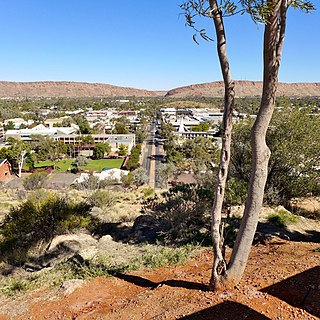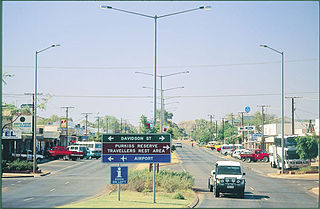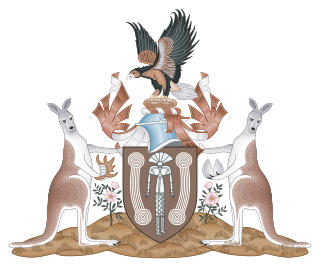
The Northern Territory is an Australian territory in the central and central northern regions of Australia. The Northern Territory shares its borders with Western Australia to the west, South Australia to the south, and Queensland to the east. To the north, the territory looks out to the Timor Sea, the Arafura Sea and the Gulf of Carpentaria, including Western New Guinea and other islands of the Indonesian archipelago.
In Australia, technical and further education or TAFE institutions provide a wide range of predominantly vocational courses, mostly qualifying courses under the National Training System/Australian Qualifications Framework/Australian Quality Training Framework. Fields covered include business, finance, hospitality, tourism, construction, engineering, visual arts, information technology and community work.

Alice Springs is the third-largest town in the Northern Territory of Australia. Known as Stuart until 31 August 1933, the name Alice Springs was given by surveyor William Whitfield Mills after Alice, Lady Todd, wife of the telegraph pioneer Sir Charles Todd. Now colloquially known as The Alice or simply Alice, the town is situated roughly in Australia's geographic centre. It is nearly equidistant from Adelaide and Darwin.

Charles Darwin University (CDU) is an Australian public university with a main campus in Darwin and eight satellite campuses in some metropolitan and regional areas. It was established in 2003 after the merger of Northern Territory University, the Menzies School of Health Research, and Centralian College.

Tennant Creek is a town located in the Northern Territory of Australia. It is the seventh largest town in the Northern Territory, and is located on the Stuart Highway, just south of the intersection with the western terminus of the Barkly Highway. At the 2016 census, Tennant Creek had a population of approximately 3,000, of which more than 50% (1,536) identified themselves as indigenous.
The College of Advanced Education (CAE) was a class of Australian tertiary education institution that existed from 1967 until the early 1990s. They ranked below universities, but above Colleges of Technical and Further Education (TAFE) which offer trade qualification. CAEs were designed to provide formal post-secondary qualifications of a more vocational nature than those available from universities, chiefly in such areas as teaching, nursing, accountancy, fine art and information technology.
Scouting and Guiding in the Northern Territory is predominantly represented by the branches of Scouts Australia and Girl Guides Australia covering the Northern Territory.
The Higher Education Support Act (HESA) 2003 is the key piece of Commonwealth legislation that governs funding for universities in Australia. The Act determines categories of providers eligible for public funding, establishes the basis for providing public funding, codifies the existing aims of universities, and introduces measures to strengthen Australia’s knowledge base.
Performing arts education in Australia refers to the teaching of different styles of creative activity that are performed publicly. The performing arts in Australia encompasses many disciplines including music, dance, theatre, musical theatre, circus arts and more. Performing arts education in Australia occurs both formally and informally at all levels of education, including in schools, tertiary institutions and other specialist institutions. There is also a growing body of evidence, from the Australian Council for the Arts and the Parliament of Australia, showing that First Nation's participation in the arts and culture has significant economic, social and cultural benefits to Australia and further supports the outcomes of the Australian governments ‘Closing the Gap’ campaign. There has been an increasing number of scholarships opening up in educational institutions for Indigenous Australians aimed at encouraging this participation in the arts.

The Australian National Aboriginal and Torres Strait Islander Education Policy (AEP) is a national policy adopted by the Government of Australia by each State and Territory government. The policy was first introduced in 1989 and is the foundation of education programs for all Indigenous Australians.

Batchelor is a town in the Northern Territory of Australia. The town is the current seat and largest town of the Coomalie Shire local government area. It is located 98 kilometres (61 mi) south of the territory capital, Darwin. A number of residents commute to Darwin and its suburbs for work. In the 2016 census, Batchelor recorded a population of 507 people, with 36% of Aboriginal and Torres Strait Islander origin.

104.1 Territory FM is a community radio station based in Darwin, Australia. Territory FM broadcasts a broad range of adult contemporary music from the Casuarina campus of Charles Darwin University. News is provided by Nine News between 5:30am and 11:00pm. Territory FM also has a long-standing media agreement with the Nine Network, broadcasting Nine News Darwin bulletins every weeknight, as well as updates from their newsroom in the afternoons and weekend sport wraps.
Jeannie Bell is an Australian linguist. She is an Indigenous Research Collaborations Fellow in Indigenous Languages and Linguistics at Batchelor Institute of Indigenous Tertiary Education. She has made substantial contributions to the development of Aboriginal tertiary education, and to the preservation of Indigenous Australian languages.

Northern Territory Cricket, formally the Northern Territory Cricket Association, is the governing body for cricket in the Northern Territory of Australia. Cricket in the Northern Territory has produced state contracted players which include Kane Richardson and Tom Andrews who are both contracted to the South Australia Redbacks.

The Living Archive of Aboriginal Languages (LAAL) is a digital archive of literature in endangered languages of Australia, containing works in over forty Australian Aboriginal languages from the Northern Territory, Australia. The project to build the archive was initially funded in 2012 by the Australian Research Council, and was developed in collaboration with the Charles Darwin University as the lead institution, the Northern Territory Government and the Australian National University. Later partners include the Batchelor Institute of Indigenous Tertiary Education, the Northern Territory Library and the Northern Territory Catholic Education Office.

The Northern Territory Minister for Education is a Minister of the Crown in the Government of the Northern Territory. The minister administers their portfolio through the Department of Education.

The North Australian Aboriginal Justice Agency (NAAJA) is a non-for-profit legal service which provides criminal law and civil law services to Aboriginal people and their families across the Northern Territory of Australia. Since 2019, it has operated the NT Custody Notification Service, whereby they are notified by NT Police when Indigenous Australians are taken into police custody.

MaryAnn Bin-Sallik is Djaru Elder and Australian academic, specialising in Indigenous studies and culture. She was the second Indigenous Australian to gain a doctorate from Harvard University.
Marina Strocchi is an internationally-exhibited Australian painter and printmaker whose work is held in many national collections. Strocchi is based in Alice Springs and has worked extensively with Aboriginal artists in Central Australia.
Peggy Napangardi Jones or Peggy Jones was a Warlpiri/ Warumungu woman born at Phillip Creek Station near Tennant Creek. She was a significant Australian Aboriginal artist who had 10 solo shows and approximately 50 group exhibitions. She was also selected in the Telstra National Aboriginal & Torres Strait Islander Art Awards and acquired by many national and international collections.











